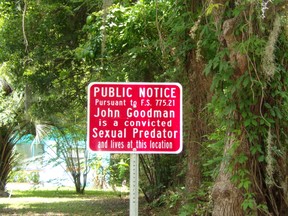Living here in a small town in North Florida, nearly everyone knows everyone else. If you don’t know a person, chances are you probably know someone who does.
It’s common knowledge what most everyone’s family history is, what they’ve done in their life, good and bad, and what kind of person they are in general.
There are a few people here that have been convicted of sex crimes, labeled a sexual predator, served their time, and then released.
We all know who they are, what they were convicted of, and the whole story behind their crimes.
Now we all have a little extra help from our county government.
In Bradford County, Florida, red signs are now required to be posted in front of a convicted sexual predator’s home as a form of notification to the community.
Most of us here thought it was no big deal, we all knew who they were anyway. But outside media attention has stirred up a debate within our county, the country, and about sexual predator laws in general.


 Mr. Goodman, a man who lives with a sign in front of his home, has been quoted as saying that he knew he’d done wrong and he "don't do things like that no more."
Mr. Goodman, a man who lives with a sign in front of his home, has been quoted as saying that he knew he’d done wrong and he "don't do things like that no more." Thinking back over earlier times of my life, I cannot remember hearing about violent sexual crimes against kids very often. Children were abducted and killed then, too, but it just wasn't national news the majority of the time.
Thinking back over earlier times of my life, I cannot remember hearing about violent sexual crimes against kids very often. Children were abducted and killed then, too, but it just wasn't national news the majority of the time.

 According to the Rape Abuse & Incest National Network, over three quarters of sexual assaults are committed by a non-stranger.
According to the Rape Abuse & Incest National Network, over three quarters of sexual assaults are committed by a non-stranger.

 How to Learn to Make Money Online Bloggingon 11/08/2015
How to Learn to Make Money Online Bloggingon 11/08/2015
 Funky Retro Fun with the Polaroid Socialmatic Instagram Camera and Accessorieson 01/01/2015
Funky Retro Fun with the Polaroid Socialmatic Instagram Camera and Accessorieson 01/01/2015
 Haunted Florida: The Legend of the I-4 Dead Zoneon 12/07/2014
Haunted Florida: The Legend of the I-4 Dead Zoneon 12/07/2014
 Easy to Make Paw Print Christmas Ornament Kiton 11/25/2014
Easy to Make Paw Print Christmas Ornament Kiton 11/25/2014



Comments